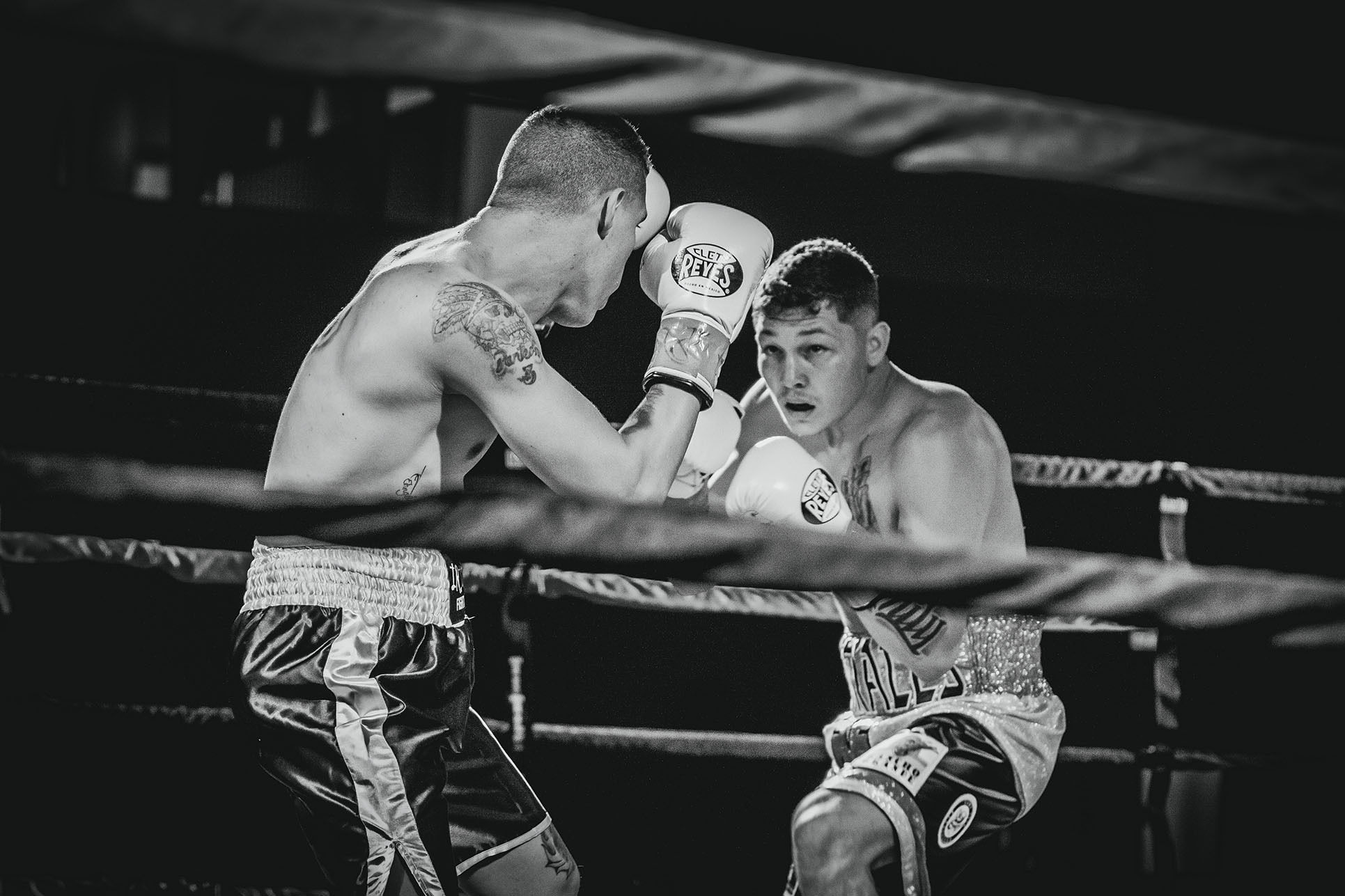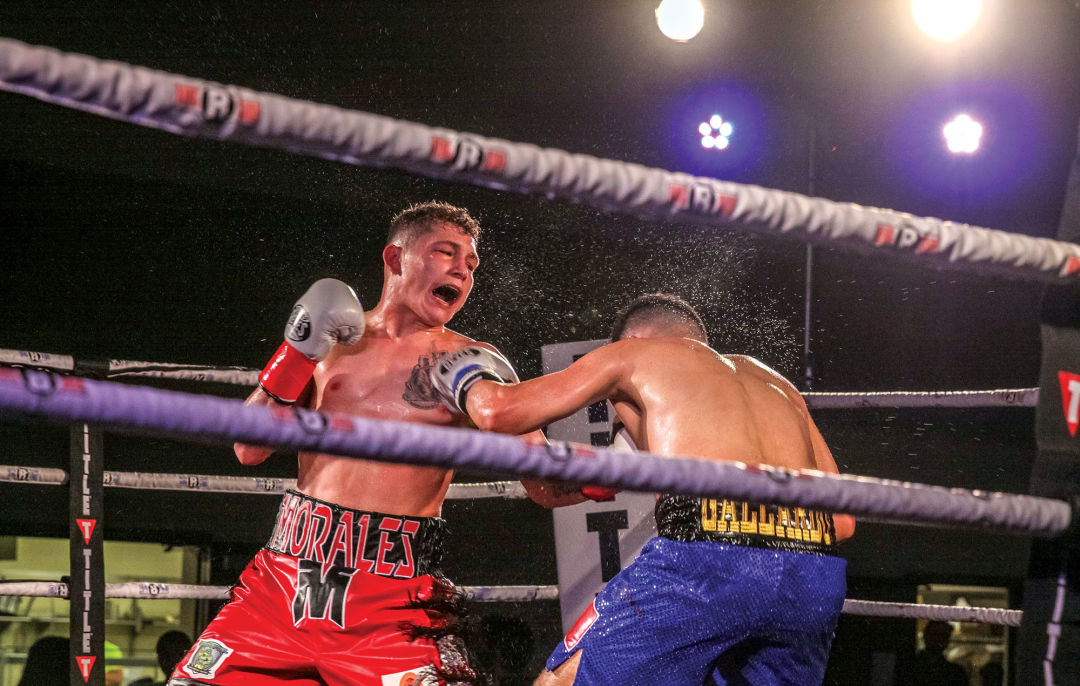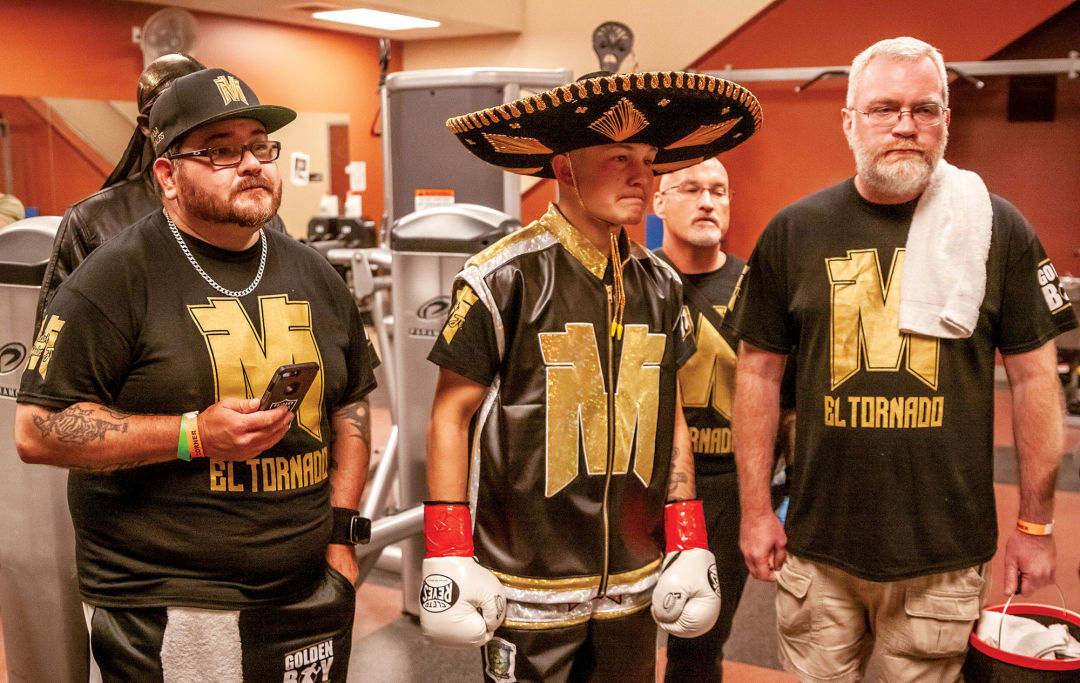
Is Victor Morales Jr. the Best Boxer to Ever Come Out of Portland?
Preparing for his next fight, Victor Morales Jr. stalks the bigger man around the ring. The eyes of Morales’s sparring partner belie an understandable fear: he’s trapped inside the ropes against a world-class boxer.
Using careful footwork, Morales cuts off his opponent’s escape route and fires a jab, then another, setting up his right hand. Having paused their own training, members of the West Portland Boxing Team sit silently along the ring, intently watching one of their own. Morales torques his body, unleashing that right; it lands with a jarring thud. The crowd doesn’t react: seeing Morales dominate is nothing new.
By the end of the round, his sparring partner has had enough. Morales—green-eyed, deceivingly baby-faced—climbs through the ropes, finished with training for the day, and takes a seat on one of the foldout chairs that line the gym, located in the basement of the Garden Home Recreation Center in Southwest Portland.
“When I come here, I’m [just] another fighter in the gym I grew up in,” says Morales. “It’s been a home for 14 years.”
Over that span Morales, who turns 22 in January, has transformed himself from an eager child at the side of his troubled father to an undefeated prospect just signed to a long-term deal by Golden Boy Promotions, a company founded by Oscar De La Hoya. With that backing, Morales will be able to get bigger fights (and bigger paydays)—so long as he keeps winning.
“It was a no-brainer,” says Golden Boy matchmaker Roberto Diaz of signing Morales. “Meeting him in person really blew me away.”
Lots of fighters have talent inside the ring, but few, says Diaz, show Morales’s poise and presence outside it. “He has all the potential to be a star,” says Diaz.

In the ring with Marcelo Gallardo in April 2019
Image: Steve Martinez
In Portland, of course, he’s already a star in boxing circles. And he hopes that he might even be the one to bring boxing back to this erstwhile fight town.
“It used to be here,” emphasizes Morales of Portland’s once-robust boxing scene, which animated the city as far back as the 1880s. By the Great Depression, the Multnomah Athletic Club was regularly hosting “smokers” that featured amateur boxers. (The Depression price for admission was 40 cents.) The club also had its own boxing team—the Winged Ms, among the best in the city. The University of Portland had a team, too. And the Knott Street Boxing Club, a historically black gym in Northeast, won a national championship in 1961. A few years later, three of its fighters were crowned individual national champs. Never before had a single club in the country hosted so many.
Even houses of worship weren’t above a good fight during boxing’s heyday, remembers local boxing fixture Fred Ryan. “I came from a family—there were five brothers, Irish-Catholic. We had a boxing team in the parish. In those days, we put on monthly shows in the church basement,” Ryan says. “After the fights, even the priests would stay there and play cards and smoke cigars and drink beer.” (Ryan’s gym, the Grand Avenue Boxing Club, remains closed after damage from a fire that was intentionally set in a nearby field last summer.)

With head trainer (and dad) Victor Morales Sr., cut man Jason Hess, and assistant Jason Marquoit
Image: Steve Martinez
However, as it did in the rest of the country, boxing’s prominence faded over time in Portland. Ring deaths, some as a result of brutal bouts that were televised live, increased awareness of the sport’s unavoidable risks. (Bob Dylan immortalized one of those 1960s-era deaths in his song “Who Killed Davey Moore.”) Boxing persists here, particularly in neighborhoods home to marginalized communities, where local gyms served as sanctuaries protecting fighters from even greater dangers on the streets.
But Morales doesn’t come from a troubled neighborhood. “I grew up in a good house. I never struggled for anything,” he says of his upbringing in the suburbs of Vancouver, Washington. “I don’t have to fight, but I want to.”
However, Morales’s father, Victor Sr., who also serves as his head trainer, had an entirely different experience. Fleeing gangs and drugs in the border town of El Paso, he came to the Northwest out of necessity, looking for a better life.
“Don’t ever come back,” Victor Sr. remembers his mother telling him. Convinced her son would wind up in prison or dead, she bought him a one-way ticket to Portland in 1996. Settling with a cousin in nearby Vancouver, he tried to change: he put street fighting behind him, fell for a local girl and got married. They had a son, Victor Jr. But old habits die hard.
One afternoon at a party, Victor Sr. felt provoked by a drunken acquaintance. The old street fighter’s temper flared, a fight ensued, and once the dust had settled, Victor Sr. remembers, it took a long time for the other guy to finally wake up.
“I should have walked away,” he admits. “I felt like I failed.”
Victor, who had boxed in his youth, realized he needed an outlet. His wife, Tabitha, tracked down the West Portland Boxing gym. He quickly fell in love with the place, despite the long drive. (“Punching a heavy bag is the most inexpensive and most effective therapy session you can have,” he says.)
Starting at age 7, Morales accompanied his dad, watching him hit the bag and work the punch mitts. Soon, he was practicing his own combinations. By 8, he had entered his first competition.
“I was a crying mess,” Tabitha remembers of watching her son in the ring. “So, I pulled myself together and, afterwards, cried some more.”
Morales won that bout and graduated from local shows to national tournaments, all with his father in his corner, literally.
“It’s horrible,” Victor Sr. says of witnessing his son fight. “It took me years to separate myself.”
Boxing became a family affair. Victor’s three younger brothers began to train with the West Portland Boxing Team. “I knew if I ever wanted to spend time with my husband and boys, I needed to get involved,” says Tabitha, who began volunteering as a boxing official for amateur bouts.
Some amateurs from boxing hotbeds like California and Texas were quick to dismiss the Portland boxer, who, nonetheless, continued to succeed. “We’re from the Northwest,” Victor Sr. jokes. “We’re not supposed to win national titles.”
What ultimately separated Morales from the hundreds of other aspiring young fighters to come out of West Portland? “He’s the hardest worker we’ve had,” says attorney Jason Marquoit, the longtime owner of West Portland Boxing.
A fighter’s style, like a golfer’s swing, is idiosyncratic. For Morales, that style is heavily dependent on his jab (boxing’s
multitool, used, among other purposes, to fend off an opponent or to set up combinations, like the jab–right hand–left hook), his intelligence inside the ring, and his footwork—despite the fact that the rising star was once paralyzed from the waist down.
At 4, Morales contracted meningitis. As part of his treatment he underwent a spinal tap, which carried the risk, albeit a small one, of becoming paralyzed. Suddenly, the energetic boy who remembers hopping all the way to the top of Multnomah Falls was left unable to walk. It took months for Morales to take his first tentative steps on wobbly legs, like a fighter getting up from a knockdown. For Morales, however, it was just another obstacle to will himself past.
In total, he won 118 amateur fights, while losing only 12. Morales hoped to reach the pinnacle of amateur boxing—the Olympics—but he was 11 days too young to compete in the 2016 games. He turned pro that year, at 18, competing at featherweight with its 126-pound limit.
His first bout, a scheduled four-rounder, resulted in an easy, unanimous-decision win. His second bout, another four-rounder, ended by knockout well before the final bell. By proving himself in these shorter bouts, Morales progressed—fighting better competition while enduring more rounds. Carefully groomed, Morales is working toward what would be his biggest challenge yet: a 12-round world title fight.
The last time a big fight was held in Portland was November 2005: Floyd Mayweather Jr. licked a southpaw by the name of Sharmba Mitchell in the sixth round at the Rose Garden.
At some point, Morales will be the desperate one in the ring, across from a world-class fighter like himself, but for now he’s simply looking for sparring partners who can keep up. Because he’s surpassed regional competitors, he now travels to LA for the final few weeks before a fight. At several of these camps he was thrown together with another undefeated 20-something, Maxim “Mad Max” Dadashev. “We trained side by side,” Morales remembers.
This past July, Dadashev died from injuries sustained during a fight that was televised live. It was the first of two ring deaths in only a week’s time. “That was really a wake-up call,” says Morales.
Still, fully aware of the stakes of his chosen profession, Morales has continued to fight, intent on winning a world title—and bringing it back to Portland. “Every fight determines the next fight,” says Golden Boy’s Diaz. But, in 2020, he hopes to have Morales fighting in a 10-round bout, possibly competing for a smaller, regional belt by the end of the year. The last step, before competing for an actual world title, is to have Morales fight a contender—someone who came up short in his own title shot.
Both Victors, Jr. and Sr., still live under the same roof in Vancouver; three times a week, they make the same tedious afternoon commute to Portland’s west side. On a bad day, it can take up to two hours.
“It was a big part of their development,” says Victor Sr. of the car rides with his growing sons. The boys would detail their days at school, discuss boxing, and, most important, absorb their father’s wisdom.
“I learned about life during our car ride from Vancouver,” says Morales. “That’s how we bonded.” It’s a bond that will have to hold strong as Morales climbs the ranks toward his childhood dream of being Portland’s next world champ.
When he gets out of the car and enters the familiar gym, Morales is now infinitely closer to that dream. But he is something new, too: a role model. “There’s a lot of kids who come in here, and they all want to turn pro,” says Marquoit, the gym owner.
Basically, they all want to be Victor.
